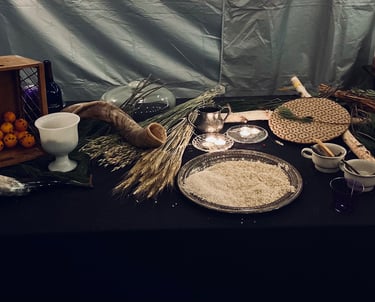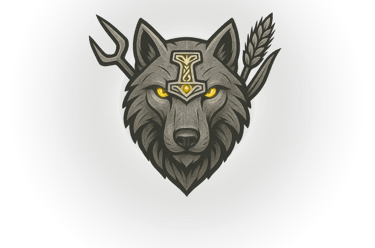Our Beliefs
Norse Heathen
Cthonic
Pagan
At Úlfsalhöll, we practice a form of modern Norse Paganism known as Heathenry—a living tradition that honors the gods, spirits, and ancestors of the pre-Christian Germanic world. The word Heathen comes from the Gothic haiþno, once used to mean "a local person" or "someone outside the Christian or Jewish traditions." Over time, it became a common English term for followers of the old ways.
We use the term Norse because most of our stories, rituals, and god-names come from Old Norse sources—especially the Poetic and Prose Eddas of early medieval Iceland. These are some of the most complete records we have of the beliefs, myths, and religious practices of our spiritual ancestors.
That said, our practice isn’t about ethnicity—it’s about honoring the wisdom of the past and living it in the present. We build rituals rooted in history but practiced with purpose today. We share mead in sumbel, make offerings in blót, and tell the stories of Odin, Thor, Freyja, Tyr, and others—not as distant figures, but as living presences that still walk with us.
At Úlfsalhöll, we honor the gods and traditions of ancient Greece, with special devotion to the chthonic powers—those of the earth, the underworld, and transformation. The word chthonic (pronounced KTHAW-nik) comes from the Greek khthonios, meaning “of the earth” or “from beneath the ground.” These deities and spirits are not dark in a negative sense, but rather deep, mysterious, and ancient. They remind us that all growth begins in the dark—seeds in the soil, healing in the quiet, rebirth through descent.
We give reverence to gods such as Hekate, Persephone, Hades, Nyx, and Gaia—powers who teach us the rhythms of life, death, and renewal. We honor them through ritual, offerings, festivals, and daily practice that emphasizes personal growth, transformation, and connection to the unseen world.
In addition to the chthonic, we also uplift the Olympian and civic traditions of ancient Greece, and give space to honor deities such as Athena, Apollon, Dionysos, and others—gods of wisdom, inspiration, and community.
Modern Paganism is a broad and diverse movement of spiritual traditions that draw inspiration from the pre-Christian religions of Europe and beyond. Rather than a single belief system, Paganism is a family of paths that center around polytheism, reverence for nature, seasonal celebration, and a deep respect for ancestral ways. Some examples of modern Pagan traditions include:
Wicca and Witchcraft – nature-based traditions often focused on magic, duality of deity, and the cycles of the earth.
Druidry – rooted in Celtic revival traditions, celebrating nature, poetic wisdom, and ancestral lore.
Animist and Reconstructionist Paths – including Baltic, Slavic, Kemetic (Egyptian), and others seeking historical grounding
At Úlfsalhöll, we are an interfaith Pagan community, which means we honor and make space for multiple traditions. We believe that no one tradition holds all the truth, and that the gods speak in many languages. Our rituals blend history, reverence, and community to create sacred space for learning, transformation, and belonging.
The Gods
Norse Heathenry
We are polytheists who honor the many gods, spirits, and ancestors of the Norse tradition. Our faith is rooted in ancient stories, but lived in the here and now—with fire, word, and deed.
We build meaningful relationships with divine beings through ritual, storytelling, toasting, and offerings. Some of us feel called to well-known deities like Odin, Thor, or Freyja—gods of wisdom, protection, and fierce passion. Others are drawn to the quieter but no less powerful ones: Hel, goddess of the underworld; Skadi, huntress of the mountains; or to the landvættir—local spirits who guard and shape the places we live.


Ritual & Devotion in Our Kindred
Rituals are how we reach across the veil—to honor the gods, connect with the spirits, and strengthen our bonds with each other. Whether Norse or Hellenic, our rites are acts of hospitality, remembrance, and power.
In Norse Practice
Our Norse rituals follow in the footsteps of the old ways: gifting to the gods, gathering in community, and honoring the cycles of life and fate. We share sacred stories, raise horns in sumbel, and make offerings to gods, ancestors, and spirits at the fire.
We share stories from the Eddas, offer to the gods in sacred blóts, and raise our voices in sumbel, the ancient rite of toasting, boasting, and remembering. We bless new homes, name children, honor ancestors, and mark the turning of the year with rites like Þorrablót, Landvættablót, Sigrblót, and Jólablót. Goði Ryan holds space with strength and purpose—offering guidance, leading rituals, casting runes, and evoking the intercession of the gods on behalf of the Kindred.
We may offer mead, fire, or song. We may link arms in shield-wall or howl to the sky. There is no single way to be Heathen—only the call to honor with truth and strength.
And while there is no formal conversion, many of us mark our first offering as the moment we truly stepped onto this path. That first gift given freely is the beginning of a sacred bond.
In Hellenic & Chthonic Practice
In our Hellenic rites, we honor the gods of Olympus and the deep powers of the earth. Our offerings might go up in flame to Helios or down into the soil for Hekate and Persephone.
We observe festivals both ancient and new: the Panathenaea, Noumenia, Thargelia, and rites at the Summer and Winter Solstices. Nicole, our resident Priestess, has guided us through libations, fire rites, invocations, and meditations that honor both light and shadow.
Chthonic rites remind us that all things grow in darkness before rising to the sun. Offerings of garlic, incense, or black wine may be given to the underworld gods. We also hold space for ecstatic devotion, for mystery, and for grief transformed into power.
What Counts as Devotion?
Not every act of worship looks like ritual. Devotion might be running in Hermes’ name. Planting sunflowers for Apollo. Cooking for others as an offering to Frigg or Demeter. Feeding the hungry for Hestia. Holding vigil under the stars for Mani.
These are devotional acts—done with intention, reverence, and the gods in your heart. Whether in the hall or the home, they are sacred.
You don’t need perfect pronunciation or a deep library of myth to belong here. You need only a willing heart, a strong voice, and a desire to stand with us as we honor the gods and build something worthy together.


Heathenry does not demand that you worship every god or even know every story. Your path is yours to walk, shaped by your experiences, your ancestors, and your choices. We embrace the gifting cycle: give in good faith, and receive in turn. We honor those who came before us, walk beside those in our community, and seek to leave the world stronger for those who will come after.
Core to our practice are the virtues of hospitality, courage, truth, and honor. These values guide our lives and shape our Kindred. We stand together like a shield wall—not always the same, but always united.
Hellenic & Chthonic Practice
We also honor the gods, spirits, and mysteries of the ancient Greek world. Our practices include both the Chthonic powers who dwell in shadow, beneath the earth and at the threshold of death, such as Hades, Persephone, and Hekate; and the Olympian deities—like Athena, Hermes, and Apollo.
Each path is different. Some come to the altar seeking joy and clarity through Apollo or Dionysus; others seek protection, transformation, or deep ancestral work with the Furies, the dead, or the spirits of the underworld. We light fires for Helios at dawn, and we pour libations into the soil at dusk. Both are holy. Both are needed.
Festivals such as Panathenaea, Noumenia, and solstice rites mark the rhythms of our year. Rites of purification, offerings of incense, and acts of devotion in everyday life help us stay connected to these sacred cycles.
In this practice, there is space for mystery and for personal experience. We don’t expect perfect recitations or rigid orthodoxy. We care that you approach with sincerity, respect, and a willingness to grow. Chthonic devotion in particular teaches us to sit with the unknown—to find beauty in shadow and meaning in change.

"Stand now beneath the All-Father’s gaze and step forward with the courage of Ask and Embla. As the shield-wall opens, know that this is a hall of frith and fate, where the gods are honored with deeds, and your voice adds strength to the kindred."
- Goði Ryan
(Inspired by Völuspá and the concept of frith, innangard, and gifting cycles)
"Descend, in spirit, through the veils of earth, to where the deep gods stir. Let Hekate guide your path, let Persephone open the gate, and let the sacred dark embrace you. In this space between worlds, we are remembered, and we remember."
- Priestess Nicole
(Inspired by Orphic hymns and Eleusinian traditions of descent and return)
ÚLFSALHÖLL
Ancient traditions. Modern Spirituality.
CONNECT WITH US
welcome@wolfhallkindred.com
+1(757) 453-5815
© 2025. All rights reserved.


